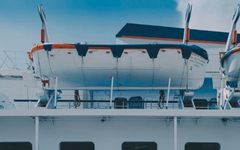What is an LPG ship?
LPG ship, also known as LPG vessel, is a specialized type of ship designed to transport liquefied petroleum gas (LPG) across the seas. The maritime industry has seen a surge in demand for LPG ships in recent years due to the growing demand for liquefied petroleum gas as a fuel source. The ships play a crucial role in the transportation of LPG from one port to another, making it possible for countries to meet their energy needs. In this article, we will delve into what an LPG ship is and what life at sea is like on board such a vessel.
LPG Ships - Maritime Industry, Life at Sea and Crew
The maritime industry is a critical component of the global economy, and LPG ships play a significant role in it. These ships transport LPG to countries that do not have access to natural gas or those that need to import the fuel to meet their energy needs. LPG ships travel to ports all over the world, including countries in Asia, Europe, North America, and South America.
Life at sea on an LPG ship can be challenging, but it also provides a unique opportunity for individuals who love the ocean and are seeking a career in the maritime industry. The crew of an LPG ship consists of highly skilled and trained individuals who are responsible for the safe and efficient operation of the vessel. The crew must be able to work well together, as they are responsible for ensuring the safe delivery of the LPG cargo.
On board an LPG ship, crew members work long hours and must be able to handle the physical and mental demands of life at sea. The ships are equipped with modern technology, making it possible for crew members to stay connected with their families and friends back home. Despite the long hours and challenging conditions, many crew members find the experience of working on an LPG ship to be rewarding and fulfilling.
LPG Ships VS LNG Ships - Main Differences
In short, LPG and LNG vessels differ in their composition, temperature, pressure, design, and infrastructure. While both types of gases are used as fuels for various applications, the vessels used to transport and store them are specialized and designed to meet the unique requirements of each type of gas.
- Composition: LPG is composed of propane and butane, which are both hydrocarbons that are extracted from natural gas and crude oil. LNG, on the other hand, is composed mainly of methane, which is extracted from natural gas fields.
- Temperature: The main difference between LPG and LNG vessels is the temperature at which the gases are transported and stored. LPG is transported and stored at a relatively high temperature of around -50°C to -10°C, while LNG is transported and stored at an extremely low temperature of around -161°C.
- Pressure: LPG is transported and stored at a higher pressure than LNG. LPG vessels are typically designed to withstand pressures of up to 10 bar, while LNG vessels are designed to withstand pressures of up to 0.7 bar.
- Design: LPG vessels are typically smaller than LNG vessels, with a capacity of up to 85,000 cubic meters. LNG vessels, on the other hand, can have a capacity of up to 266,000 cubic meters.
- Infrastructure: The infrastructure required for transporting and storing LPG and LNG is different. LPG can be transported in small vessels and stored in tanks on land, while LNG requires specialized vessels and infrastructure, including LNG terminals, to handle the extremely low temperatures at which it is transported and stored.
In conclusion, an LPG ship is a specialized type of ship designed to transport liquefied petroleum gas across the seas. The maritime industry plays a critical role in the global economy, and LPG ships play a significant role in this industry. Life at sea on an LPG ship can be challenging, but it also provides a unique opportunity for individuals who love the ocean and are seeking a career in the maritime industry. With modern technology, crew members are able to stay connected with their families and friends back home, making life at sea on an LPG ship a fulfilling and rewarding experience.






